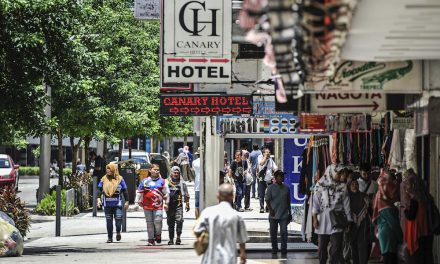PETALING JAYA | Businesses in Malaysia, forced to scale down or even stop operations, are looking at extensive financial losses in the coming weeks and months.
The likely losses businesses will suffer range from RM100,000 to RM300,000 each for the smaller companies and more than RM5 million each for the larger ones, according to the Federation of Malaysian Manufacturers (FMM).
Its president, Tan Sri Soh Thian Lai, warned that the financial constraints experienced by these companies could be prolonged even after recovery efforts begin.
Soh was commenting on the steps taken to curb the spread of Covid-19 through the implementation of the movement control order (MCO) and its impact on businesses.
Since the MCO was put in place on March 18, companies whose products or services that are considered non-essential have had to stop operations while those that offer essential products and services are allowed to continue operating with only 50% of their labour force to adhere to requirements for social distancing.
Soh told theSun yesterday that of the 945 companies that responded to an FMM survey on the impact of the MCO on business, 51.7% did not get the green light to continue operations. Only 9.5% of them are allowed to operate but only at 50% capacity and another 26.1% are awaiting approval from the authorities.
He said this would lead to “huge financial losses” for businesses.
“On average, small companies stand to lose sums ranging from RM100,000 to RM300,000 per month. The medium-size companies can expect losses of RM1 million to RM5 million. Some larger companies have even reported losses of more than RM5 million.”
Soh said the financial constraints faced by businesses would not only be prolonged but also compounded even as they begin to recover from a period of inactivity and disruptions to production. They will face problems as they begin to recover and then rebuild their operations that would have suffered greatly during this period, he added.
Labour-intensive businesses will be badly hurt by the forced reduction in manpower. Those who deal with perishable goods will be the most affected.
According to Kuala Lumpur Vegetable Wholesalers Association president Wong Keng Fatt, manpower for stalls at wet markets have been reduced significantly following the implementation of the MCO.
“A vegetable seller employs seven or eight foreign workers for each stall he operates. Those who own bigger stalls may need up to 10 workers. Initially, Kuala Lumpur City Hall (DBKL) informed us that we were allowed only two workers per stall,” he told theSun.
This, he said, made it difficult to transfer vegetables from lorries to stalls. “The process now takes us twice as long to complete.”
However, Wong said, after negotiations with the DBKL, it was agreed that each stall would now have three workers on the afternoon shift and three on the midnight shift.
The vegetables are harvested in Cameron Highlands and transported each day to the wholesale markets in various parts of the country.
Wong said he had asked transport operators to pick up the vegetables earlier to give traders more time to unload produce from lorries when they arrive at the markets.
He added vegetable sellers also take turns to operate their stalls to meet social distancing requirements.
“We open on alternate days. Some of us will open on Mondays, Wednesdays and Fridays, while others will open on Tuesdays, Thursdays and Saturdays. That way, we keep the food supply chain going, but also keep to the guidelines on social distancing,” he said.









